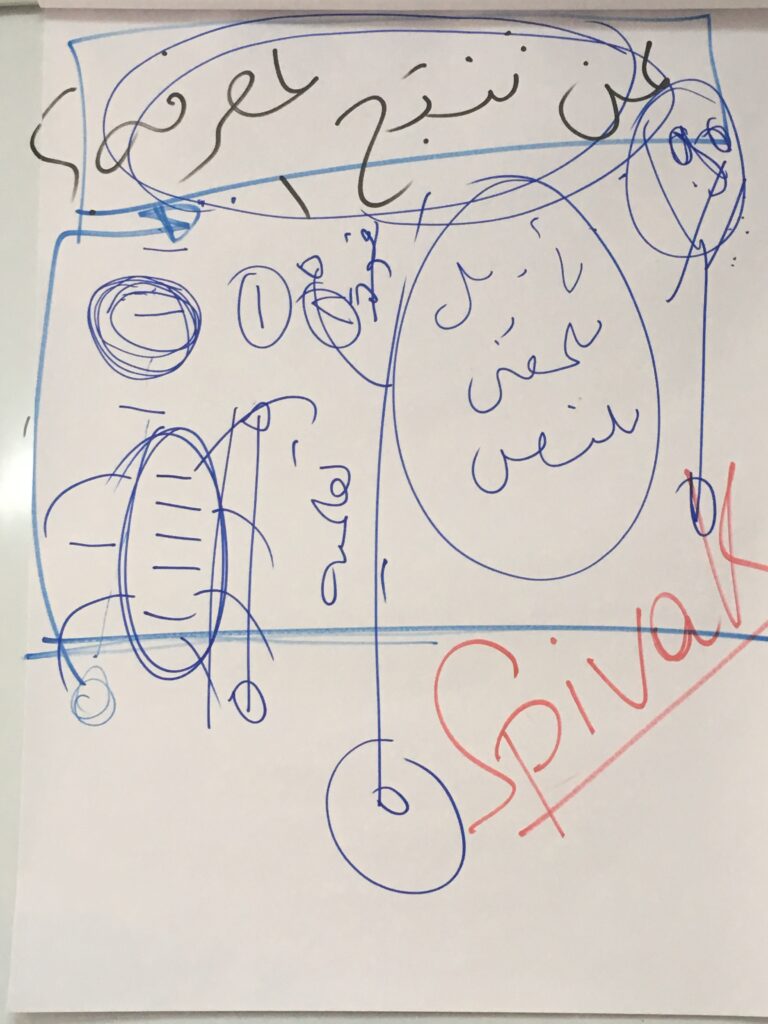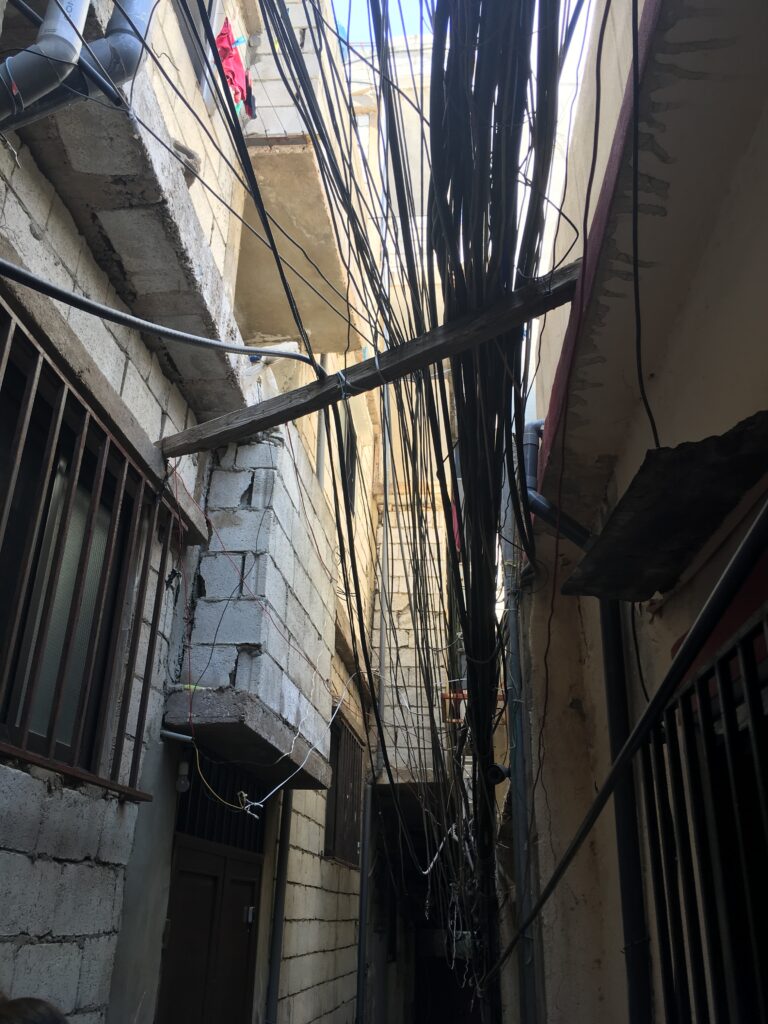Publications
Further below you will find various open access publications of our research project according to the following topics (publications will be added continuously):
- Transformative Research
- Solidarities in Lebanon
- War, Reconstruction and Solidarity Economy
These topics correspond with our research foci. Based on reconfiguring solidarities in conflict and war zones, KnowWar rests on the following pillars:
a) To research solidarities in and between marginalized Syrian, Palestinian, and Lebanese
communities in Lebanon,
b) to work out a concept of solidarity economy under conditions of armed conflict in Syria
and colonial occupation in Palestine, and
c) to conceptualise epistemologies for transformative research strategies.
The contributions are available in Arabic as well. They can be found in the Arabic section of our homepage (and will be added continuously).
We hope our interventions are interesting for you!
asdfasdfasdfasdfasdf

Transformative Research
asdfasdf
Nisren S.H. | Helmut Krieger | Adriana Qubaiova | Klaudia Wieser (2022): A Holistic Approach to Survival: Transforming Research Strategies in Contexts of War and Conflict Zones. KnowWar Publication Series, Vienna
Abstract: The autors propose a holistic approach to survival as a transformative research strategy by foregrounding Syrian women’s readings, analyses and strategies of research under the conditions of massdissplacement and war. Knowledge producers united around issues such as forced disappearance and foregrounding of women’s voices in public debates. Pain was turned into action, and the collective led the process of research and defined its purpose and strategies.
Lena Meari | Linda Tabar (2022): Decolonial Feminist Methodologies and Transformative Knowledge Production in/on the Arab Region: The Case of Syrian Women. KnowWar Publication Series, Vienna
Abstract: While there is a literature which critiques Orientalist-colonialist approaches to analysing Arab (Third world) women, there is a lack of literature that focuses on the methodological and epistemological perspectives that contribute to the reproduction of orientalist-colonialist perspectives. This paper attempts to consider the possibilities that decolonial feminist methodologies can open up for exceeding this predicament, thus inviting further reflections on how decolonial feminist methodologies might be applied in scholarship by and on Arab women’s struggles against the interconnected formations of patriarchy, war and settler colonialism in the region. It asks: what epistemological and methodological approaches and methods are required and can enable us to produce decolonial feminist knowledges that expose how interlocking modern power/coloniality shape women’s lived experiences in order to facilitate its transformation? How can decolonial feminist knowledge production also be rethought as a process of collaboration with women who resist these material conditions?
The paper argues that the hegemony of liberal feminist approaches and the methodologies connected with them further the reproduction of the coloniality of power in the real social world and in the knowledge production on this social world. It offers examples from reports published by international organisations on Syrian women which reflect the limitations of overlooking structural forces that condition Syrian women’s realities. The paper provides preliminary suggestions to think through and develop decolonial feminist methodologies that relink the decolonisation of knowledge production to practices that aim at decolonisation and the transformation of material structures of power.
asdfasdfasdfasdfasdf

Solidarities in Lebanon
asdfasdfasdfasdfasdf
Raed Eshnaiwer (2022): Critique of the Humanitarian Aid System: Social Solidarity and Alternative Approaches to Refugees and Displacement. KnowWar Publication Series, Vienna
Abstract: This paper presents some critiques on the international humanitarian aid system, its practices and methods in the contexts of forced migration. It examines how the aid system and international organisations may exacerbate the vulnerability of refugees and local communities through the different controlling mechanisms applied to aid recipients, rather than improving their precarious situation, ensuring their dignity and protecting them from states’ violations of their rights. The paper also discusses solidarity, particularly social solidarity, as one of the complementary/supportive societal approaches to deal with refugee issues. However, it does not propose considering solidarity as a fully fledged alternative approach to the aid system, since neither can fully replace the other.
Rawya Moussa | Farrah Kattab (2022): Popular Committees in Lebanon and their Role in the Revolutionary Transformation of Society and the Palestinian National Struggle. KnowWar Publication Series, Vienna
Abstract: This research paper aims to analyse the reality of the Popular Committees in Lebanon, their socio-political and national role during the seventies and eighties period, their role under the current circumstances and challenges (Syrian asylum in the Palestinian camps, economic collapse, Covid-19),the mechanism used by the Popular Committees to establish social solidarity networks in the light of challenges and difficulties, their role in changing the concept of solidarity and Palestinian National Struggle, the shortcomings in the mechanism of work and performance of the Popular Committees, and the factors that play a negative role in influencing the Popular Committees and their national role. This research paper also includes a set of recommendations that were put forward during the discussions with secretaries, members of Popular Committees, and activists in the Palestinian camps to highlight and realise their role.
aaaaaaa

War, Reconstruction and Solidarity Economy
asdfasdfasdfasdfasdfasdfasdfasdfasd
Helmut Krieger (2022): ‘Diejenigen, die zurückgeblieben sind, waren überlebende Geister’. Das palästinensische Flüchtlingslager Yarmouk und der Aufstand in Syrien. KnowWar Publication Series, Vienna
Abstract (Engl.): This paper focuses on the experiences and analyses of two activists from the Palestinian refugee camp Yarmouk in the south of Damascus, Abdallah Alkhatib and Ahmed Hassan. They were interviewed on the following key issues: the spillover of the uprising in Syria on Yarmouk, the significance neutrality had in Palestinian analyses, the Syrian regime’s war strategies, the phenomenon of militarisation of the uprising, the rise to power of jihadist organisations, and the fundamental issue of their own political as well as social activities under conditions of sieges, bombardments, and jihadist control of the camp. The paper sets out a multidirectional understanding of developments in Yarmouk as well as, more generally, of Palestinian existence in Syria in times of conflict and war. In doing so, it creates scope for approaching a suppressed history of the war in Syria in a comprehensive way.
Abstract (Ger.): Im Zentrum dieses Beitrages stehen die Erfahrungen, Einschätzungen und Analysen von zwei Aktivisten aus dem palästinensischen Flüchtlingslager Yarmouk im Süden von Damaskus, Abdallah Alkhatib und Ahmed Hassan, die zu folgenden Schwerpunkten interviewt wurden: die Ausstrahlungen des Aufstandes in Syrien auf Yarmouk, die Bedeutung von Neutralität in palästinensischen Einschätzungen der Lage, die Kriegsstrategien des syrischen Regimes, das komplexe Phänomen der Militarisierung des Aufstandes, die Machtübernahme durch jihadistische Organisationen sowie die grundlegende Frage nach den eigenen Möglichkeiten politischer und sozialer Aktivitäten unter Bedingungen von Blockade, Bombardierungen und jihadistischer Präsenz. In dem Beitrag wird ein multiperspektivisches Verständnis konkreter Entwicklungen in Yarmouk sowie, allgemeiner, der palästinensischen Existenz in Syrien in Zeiten des Krieges dargelegt. Damit schafft er die Möglichkeit, sich einer verdrängten Geschichte des Krieges in Syrien differenziert anzunähern.
Tareq Sadeq (2022): Solidarity Economy and the Struggle of Trade Unions: One Combined Approach for Resilience and Resistance in Palestine. KnowWar Publication Series, Vienna
Abstract: Recent years have seen growing debates about the optimal structure of the Palestinian economy. Out of more than 28 years of enforced economic dependency on the relation with the colonial Israeli power, the need emerged to change the structure of the Palestinian economy to be inclusive and resistant against colonialism. This paper seeks the potential founding structure which can empower solidarity and resistant economic actions. Trade unions, marginalised during the post-Oslo era by the political factions and the Palestinian Authority, are at the centre of our investigation. The paper finds that trade unions, as decentralised wide networks struggling for the rights of workers, have a potentially adequate structure for a solidarity economy supporting the resilience and resistance of the Palestinian people against the Israeli colonial power.
Syrian Center for Policy Research (SCPR) (2022): Identity Politics in Syria: A Background Paper. KnowWar Publication Series, Vienna
Abstract: The bloody conflict that has been going on for the past 11 years entailed systematic processes aimed at mobilising individual and collective identities and turning them into an instrument in the conflict, thereby forcing cultural affiliations and identities onto the battlefield. This was achieved through different practices and policies, including intimidation, incitement, hatred, fanaticism, demonisation, and dehumanisation, as well as amplification of sectarian, ethnic, political, social, regional and class differences.
This paper builds on the following main questions: why focus on ‘Identity politics’ and how has this concept been employed by warring parties in Syria? Why has the description of the armed conflict after the Syrian uprising as a sectarian-based and/or ethnicbased conflict become dominant in many academic and political studies or even in activists’ testimonies?
This background paper first presents an overview of the impact of the Syrian war and the massive destruction it has caused, both economically and socially, over the past decade. Secondly, a theoretical and conceptual background will be presented. It briefly addresses the concept of ‘Identity Politics’ and the differences among the theoretical schools regarding the relationship between identity, culture and politics, particularly the relationship between ‘Identity Politics’ and conflicts within some countries after the end of the Cold War. Third, the concept of ‘Identity Politics’ will be used to analyse rhetorical and actual sectarianisation, especially the fact that many warring forces adopted an exclusionist discourse, and carried out violent acts based on an explicit sectarian or ethnic basis. Finally, the conclusion proposes a theoretical framework and an approach to analyse the impact of employment of ‘Identity Politics’ in the Syrian conflict, which takes into account the necessity of analysing current local solidarity mechanisms, and their role in addressing the divisions imposed by the conflict, on the one hand, and linking them to the political economy and challenges imposed by the lack of justice and accountability, and the sustainable plans to address the impacts of the war, on the other.